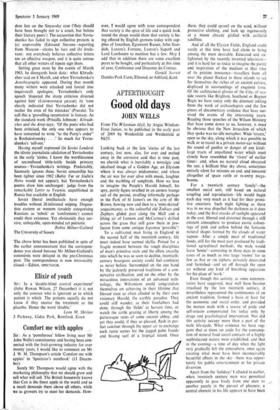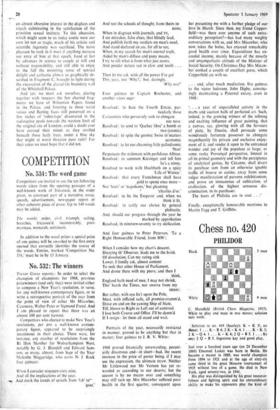Good old days
AFTERTHOUGHT JOHN WELLS
From The Wilsonian Idyll, by Angus Windsor- Frost Junior, to be published in the early part of 2069 by Weidenfeld and Weidenfeld at Nf55.
Looking back at the late 'sixties of the last century, lost now, alas, for ever and melted away in the corrosive acid that is time past, we cherish what is inevitably a nostalgic and idealised image of a Golden Age, an Elysium where it was always midsummer, and where the air was for ever alive with music, laughter and the warbling of songbirds. How we love to imagine the People's Harold himself, his spry, portly figure swathed in an austere lounge suit of the period, strolling informally perhaps in the Park of St James's on the arm of Mr Brown, bowing now and then to a 'mini-skirted' acquaintance, as the colourful old Zodiacs and Zephyrs glided past along the Mall and a lilting air of Lennon and McCartney's drifted across the grass that still grew there in pro- fusion from some antique Japanese 'portable!
To a cultivated man living in England in the second half of the twentieth century, life must indeed have seemed idyllic. Poised for a fragile moment between the rough disciplines of man's primitive state and the effete anarchy into which he was so soon to decline, twentieth- century bourgeois society could feel confident as never before. Surrounded on the one hand by the jealously preserved traditions of a con- servative civilisation, and on the other by the miraculous innovations of an advanced tech- nology, the Wilsonians could congratulate themselves on achieving in their lifetime that blessed state so often alluded to by their own visionary, Harold, the earthly paradise. They could still wander, as their forefathers had done, through the 'fields' at harvest time, or watch the cattle grazing at liberty among the picturesque ruins of some ancient abbey, and yet they could, if they so pleased, flash in per- fect comfort through the upper air to exchange such rustic scenes for the jagged palm fronds and hissing surf of a tropical island. Once
there, they could sprawl on the sand, without protective clothing, and look up ingenuously at a moon already girdled with artificial satellites.
And of all the Elysian Fields, England could surely at this time have laid claim to being among the most desirable. Educated and en- lightened by the recently invented television— and it is hard for us today to imagine the purity and inspiration of the medium at that time of its pristine innocence—travellers from all over the planet flocked to these islands to see for themselves the riches of an ancient culture,
displayed in surroundings of exquisite taste. Of the architectural glories of the City, of sea-
side resorts like Brighton, Southend or Bognor Regis we have today only the dimmest inkling from the work of archaeologists and the few pieces of documentary evidence that have sur- vived the events of the intervening years.
Reading those speeches of the Wilson Ministry that have come down to us, however, it must be obvious that the New Jerusalem of which they spoke was no idle metaphor. Wide 'streets,'
open to the sky, along which it was possible to walk or to travel in a private motor-car without
the sound of gunfire or danger of any kind: large tracts of unpolluted water which must closely have resembled the 'rivers' of earlier times: and, when no natural cloud obscured the sun, a brilliant blue sky above, sometimes entirely silent for minutes on end, and innocent altogether of space rattle or re-entry mega- booms.
For a twentieth century `family'—the smallest social unit, still based on natural
coupling and reproduction—life would begin each day very much as it had for their primi- tive ancestors. Such night lighting as there was in no way dispelled the darkness as it does today, and the first streaks of sunlight appeared in the east, filtered and distorted through a still existent atmosphere to produce exotic colour- ings of pink and yellow behind the fantastic natural shapes formed by the clouds of water vapour. After a simple meal of traditional foods, still for the most part produced by tradi- tional agricultural methods, the male would leave 'home'—consisting in those days in some cases of as much as two large 'rooms' for as few as five or six ciphers, privately decorated and furnished—and set off through the open air without any kind of breathing apparatus for his place of 'work.'
Even though this activity, as some commen- tators have suggested, may well have become
ritualised by the late twentieth century, it nevertheless represented the continuance of an ancient tradition, formed a basis at least for the economic and social order, and provided the mature male with a source of pride and self-esteem compensated for today only by drugs and psychological intervention. Nor did this activity occupy more than a part of the male life-cycle. What evidence we have sug- gests that at times set aside for the consump- tion of natural food social contacts of a highly sophisticated nature were established, and that in the evening—a time of day when the light very gradually left the atmosphere, once again creating what must have been inconceivably beautiful effects in the sky—there was oppor- tunity for public entertainment or for private diversion.
Apart from the 'holidays' '1 alluded to earlier, when twentieth century man was permitted apparently to pass freely from one state to another purely in the pursuit of pleasure, a central element in his life appears to have been
an almost obsessive interest in the displays and rituals culminating in the satisfaction of the primitive sexual instincts. To this obsession, which might seem to us today comic were our own lot not so tragic, much of his artistic and scientific ingenuity was sacrificed. The naive pleasure he took in it must if anything increase our envy of him at that epoch, freed at last by advances in science to couple at will and without responsibility, and still able to enjoy to the full the mounting sense of sensual delight and cathartic climax so graphically de- scribed in Fragment C, brought to light during the excavation of the glazed-tile boundary wall of the Whitehall Palace.
And yet, we must ask ourselves, piecing together with tweezers the few charred frag- ments we have of Wilsonian Papers found in the Palace, and listening to those weird voices and fleeting faces still preserved on a few inches of 'video-tape' discovered in the radioactive pools towards the western limit of the original site of London, could a doubt ever have crossed their minds as they strolled beneath those leafy trees, under a blue sky that might at worst threaten pure rain? For their sakes we must hope that it did not.



































 Previous page
Previous page